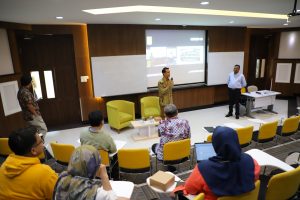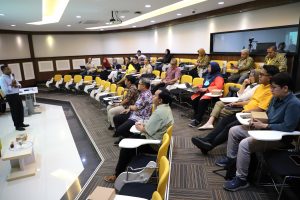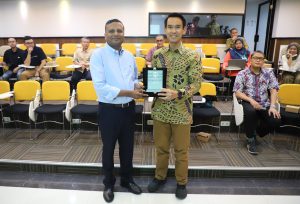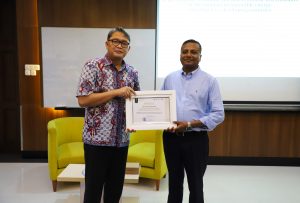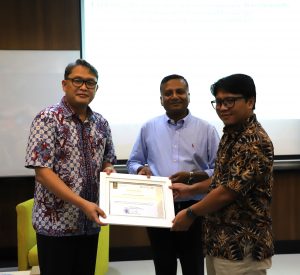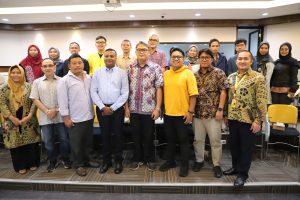Non-Ekonomi dari Investasi Energi Terbarukan
Nino Eka Putra ~ Humas FEB UI
DEPOK (8/7/2024) – Profesor Gazi Salah Uddin, Senior Associate Professor of Financial di Universitas Linkoping Swedia, menjadi pembicara pada Kuliah Tamu Program Pascasarjana Ilmu Manajemen Fakultas Ekonomi dan Bisnis Universitas Indonesia (PPIM FEB UI) yang bertajuk ‘Exploring The Economic and Non-Economic Determinants of Investments in Renewable Energy’ di Auditorium Mini, Departemen Manajemen FEB UI, Senin (8/7).
Kuliah umum ini merupakan bagian dari rangkaian Visiting Professor Gazi Salah Uddin selama tiga hari, dimulai dari Senin, 8 Juli hingga Rabu, 10 Juli. Arief Wibisono Lubis, Ph.D. selaku Wakil Dekan 1 Bidang Pendidikan, Penelitian, dan Kemahasiswaan FEB UI juga turut hadir untuk memberikan sambutan.
Dalam presentasinya, Prof. Gazi Salah Uddin menjelaskan bahwa ada tiga krisis energi utama di dunia, yaitu perubahan iklim, menipisnya cadangan bahan bakar fosil, dan ketidakstabilan pasar bahan bakar. Untuk mengatasi krisis ini, transformasi ke energi terbarukan sangat diperlukan, dengan anggaran sekitar lima triliun USD per tahunnya hingga tahun 2030 untuk mencapai nol emisi pada tahun 2050.
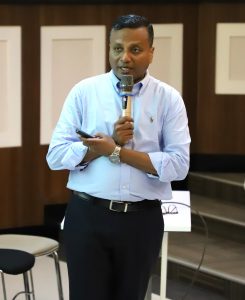
Negara-negara maju yang sudah mengadopsi energi terbarukan merasakan manfaat signifikan pada pertumbuhan ekonomi mereka, terutama dalam mendorong pembangunan industri melalui elektrifikasi. Selain itu, globalisasi sosial memiliki dampak yang lebih kuat terhadap investasi energi terbarukan di negara-negara maju dibandingkan di negara-negara berkembang, khususnya dalam konteks seluruh spektrum investasi energi terbarukan.
“Studi ini memberikan kontribusi penting bagi literatur energi terbarukan dengan fokus pada reinvestasi daripada konsumsi, dengan mempertimbangkan faktor ekonomi dan non-ekonomi. Saya juga mengidentifikasi faktor-faktor non-ekonomi seperti globalisasi sosial, teknologi lingkungan, kerentanan iklim, dan ketidakstabilan politik,” ujar Prof. Gazi.
Prof. Gazi menjelaskan, ada perbedaan yang signifikan antara negara berkembang dan negara maju dalam efek investasi energi terbarukan, yang juga dipengaruhi oleh siklus investasi. Namun, ada kesamaan seperti faktor pajak dan kerentanan lingkungan berkontribusi pada peningkatan investasi. Di negara maju, kerentanan iklim secara konsisten mendorong reinvestasi di seluruh siklus investasi, sedangkan di negara berkembang, efeknya lebih terasa di akhir siklus investasi. Hal ini dapat dijelaskan oleh beban perubahan iklim lebih besar yang ditanggung oleh negara-negara berkembang.
“Oleh karena itu, kebijakan dan regulasi harus memberikan insentif bagi industri ramah lingkungan yang harus seimbang antara pertumbuhan ekonomi dan pelestarian lingkungan. Diperlukan kerangka pajak lingkungan yang kuat, peningkatan dalam globalisasi sosial untuk kolaborasi internasional dalam pengetahuan dan teknologi, penanganan kerentanan iklim melalui infrastruktur energi terbarukan yang tahan terhadap perubahan iklim, serta stabilitas politik yang terjamin untuk mengendalikan inflasi,” tutup Prof. Gazi dalam presentasinya.
————————————————————
Visiting Professor Gazi Salah Uddin as Guest Lecturer at PPIM FEB UI Discussing The Economic and Non-Economic Determinants of Investments in Renewable Energy
Nino Eka Putra ~ Public Relations of FEB UI
DEPOK (8/7/2024) – Professor Gazi Salah Uddin, Senior Associate Professor of Financial at Linkoping University, Sweden, spoke at the Graduate Program Guest Lecture of the Faculty of Economics and Business, Universitas Indonesia (PPIM FEB UI) on ‘Exploring The Economic and Non-Economic Determinants of Investments in Renewable Energy’ held at the Mini Auditorium, Department of Management, FEB UI on Monday (8/7).
This public lecture is part of Visiting Professor Gazi Salah Uddin’s three-day series, starting from Monday, July 8 until Wednesday, July 10. Arief Wibisono Lubis, Ph.D., Vice Dean for Education, Research, and Student Affairs at FEB UI, was also present to deliver opening remarks.
In his presentation, Prof. Gazi Salah Uddin explained that there are three major energy crises in the world: climate change, depletion of fossil fuel reserves, and fuel market instability. Addressing these crises necessitates a transition to renewable energy, requiring an estimated budget of around five trillion USD annually until 2030 to achieve zero emissions by 2050.
Advanced countries that have adopted renewable energy are experiencing significant economic growth benefits, particularly in driving industrial development through electrification. Additionally, social globalization has a stronger impact on renewable energy investments in advanced countries compared to developing countries, especially across the entire spectrum of renewable energy investment.
“This study contributes significantly to the renewable energy literature by focusing on reinvestment rather than consumption, considering both economic and non-economic factors. I have also identified non-economic factors such as social globalization, environmental technology, climate vulnerability, and political instability,” said Prof. Gazi.
Prof. Gazi explained that there is a significant difference between developing and developed countries in the effects of renewable energy investments, influenced by investment cycles. However, similarities exist, such as tax factors and environmental vulnerability contributing to increased investments. In developed countries, climate vulnerability consistently drives reinvestment throughout investment cycles, whereas in developing countries, its effects are more pronounced towards the end of investment cycles. This can be explained by the greater burden of climate change faced by developing countries.
“Therefore, policies and regulations should incentivize eco-friendly industries that strike a balance between economic growth and environmental preservation. A robust environmental tax framework is needed, along with enhanced social globalization for international collaboration in knowledge and technology, climate vulnerability management through resilient renewable energy infrastructure, and guaranteed political stability to control inflation,” concluded Prof. Gazi in his presentation.
